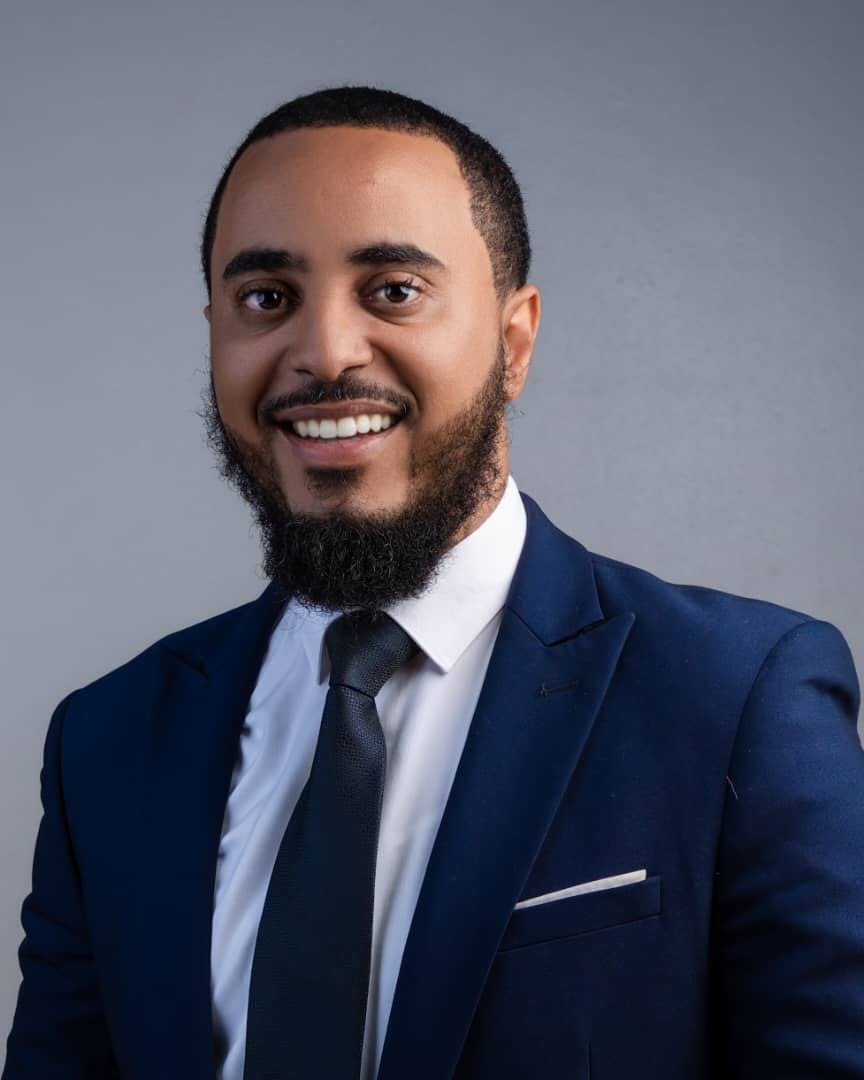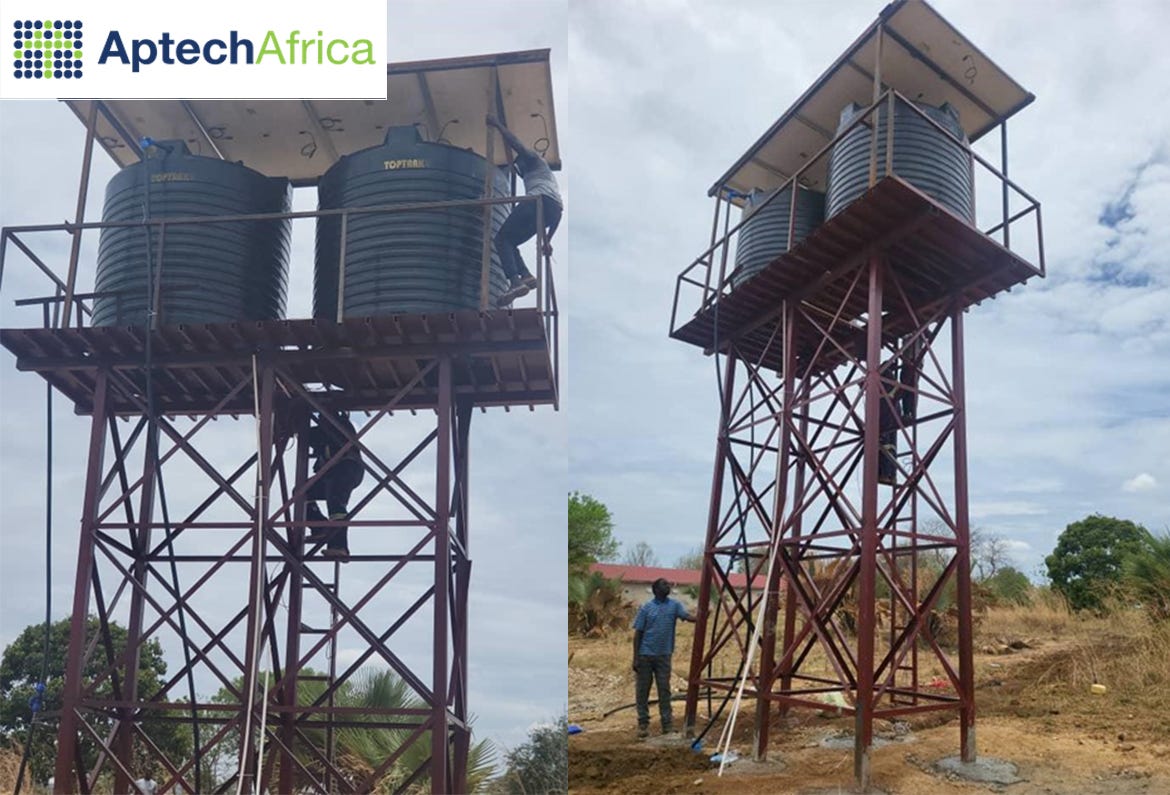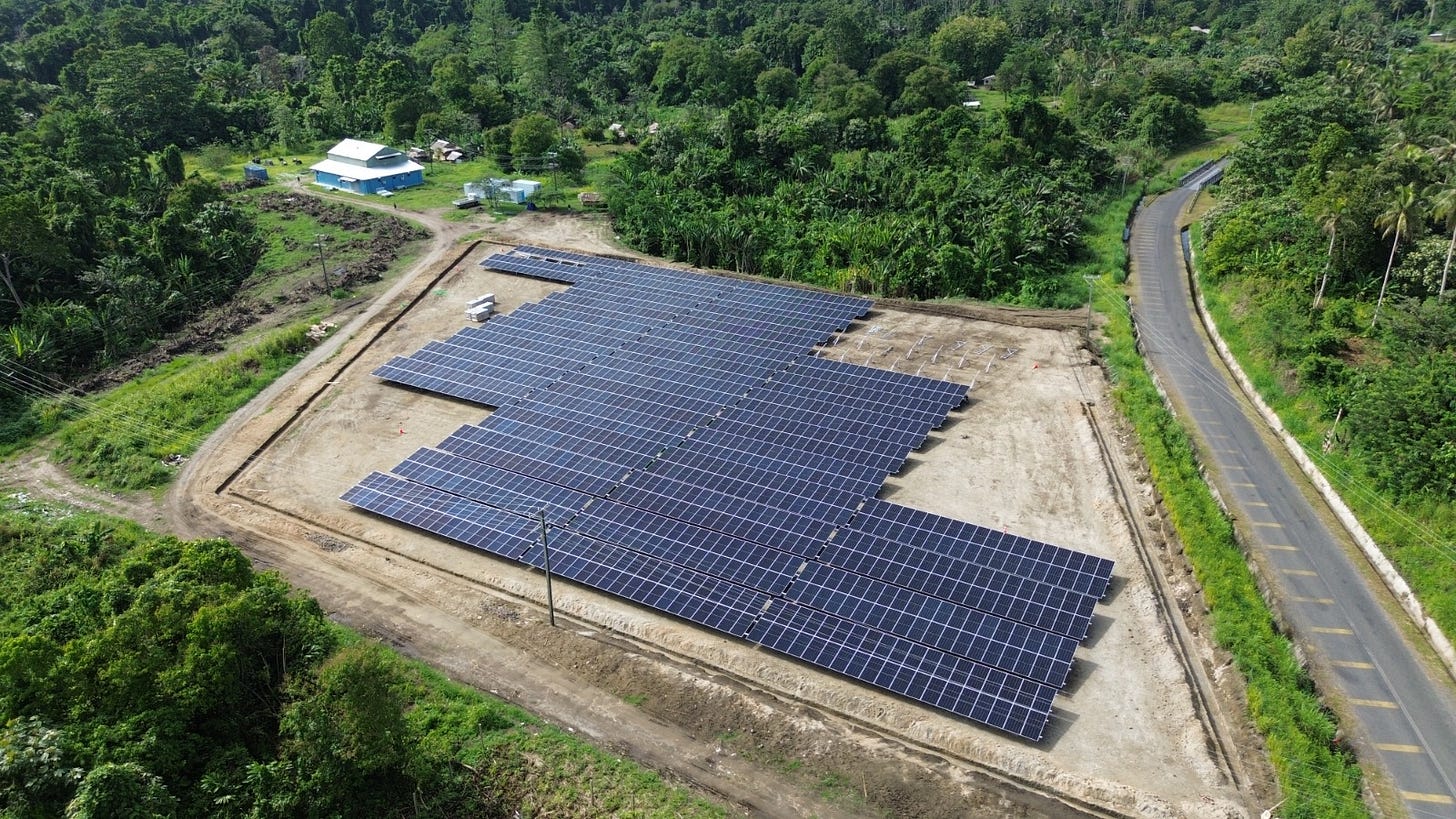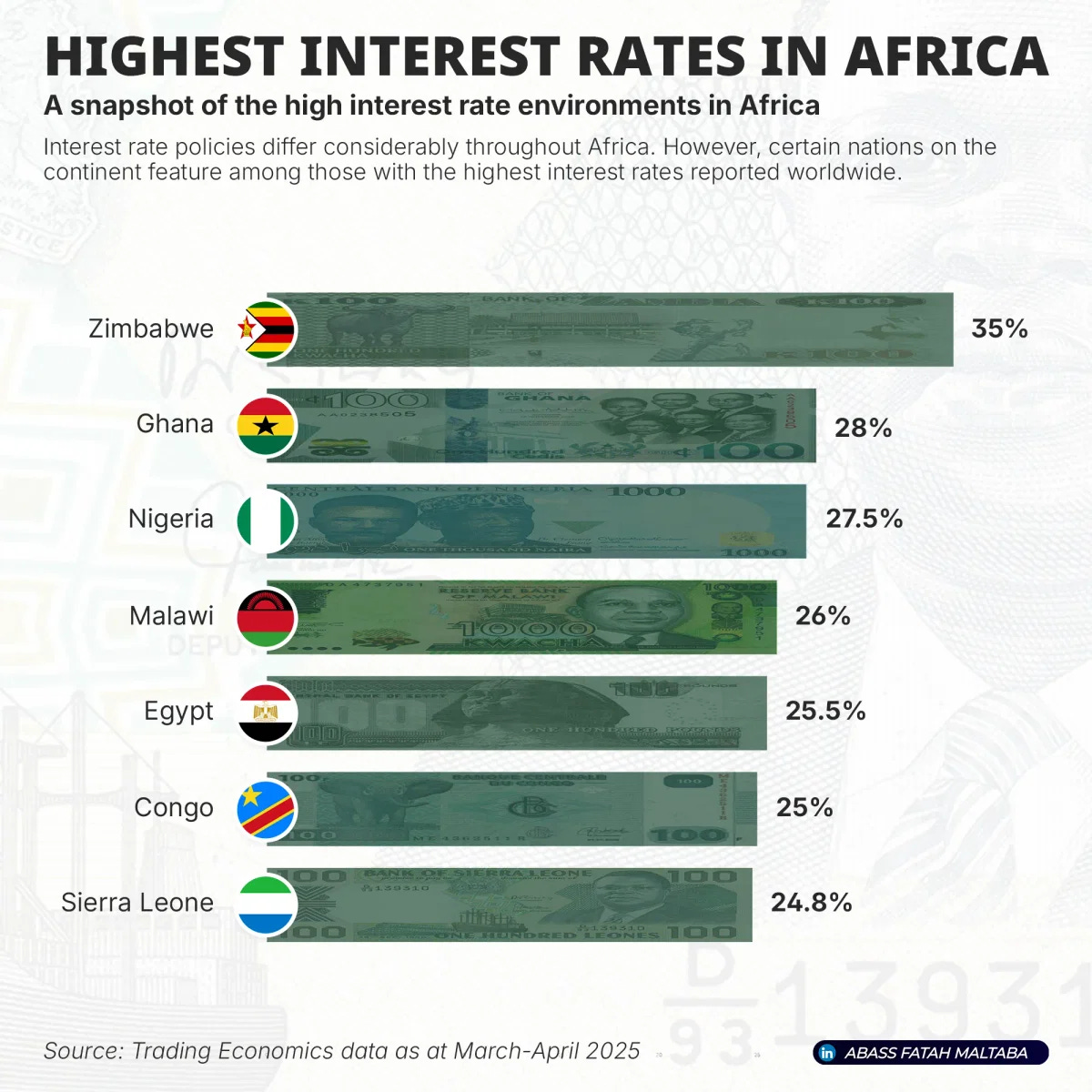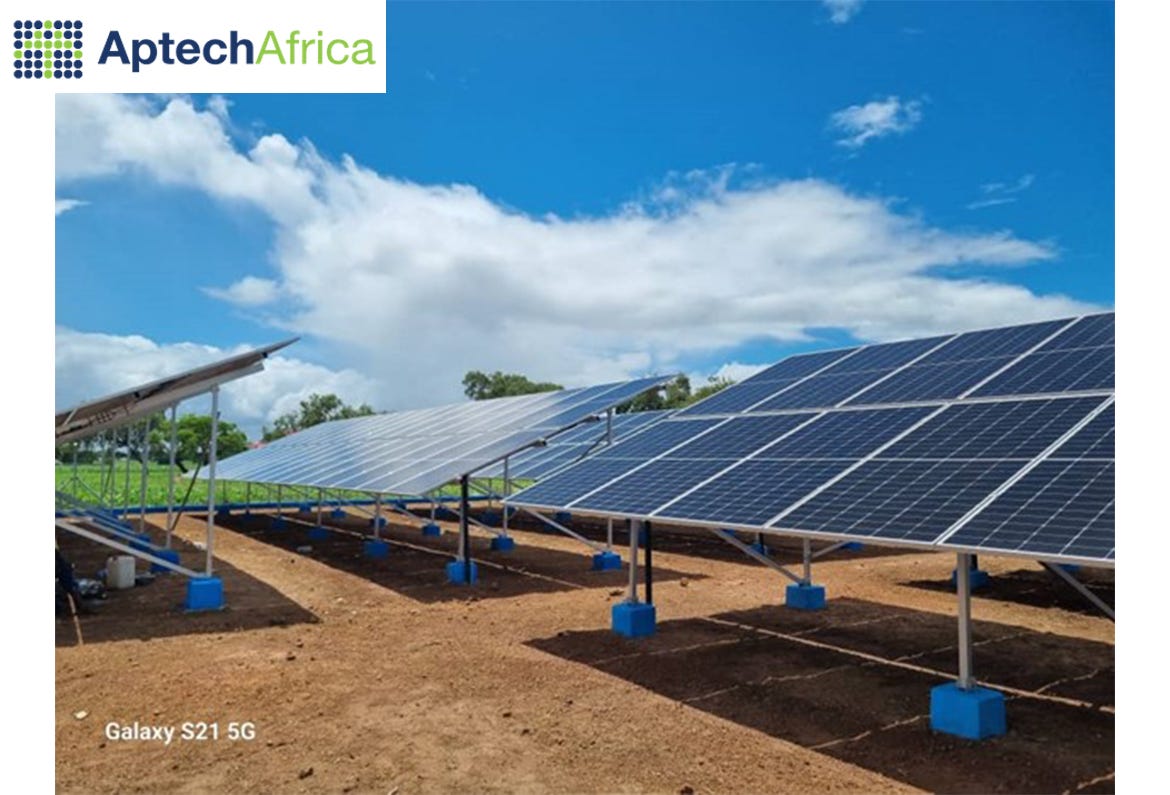Aptech Africa, founded by two brothers from Eritrea in 2011, has overcome extraordinary challenges to become a leading African solar installer and a profitable, fast-expanding multinational company. Their main office is in Kampala, Uganda, and they have installed solar projects in 31 countries and counting. Metkel Zerai Abraham is a co-founder and the current CEO of Aptech Africa.
In the interview below, this writer’s questions and comments are in bold, Mr. Abraham’s words are in regular text, and extra clarification (links, etc) added after the interview are in bold italics or footnotes.
Could you tell me the amazing story of how you founded Aptech Africa?
So, my name is Metkel Abraham, younger brother of Ghirmay Abraham. Ghirmay Abraham graduated from mechanical engineering and he had this solar background. He was doing some small scale system when he was in Eritrea, where we are from. By then I was in Uganda. We went to South Sudan together to start this business.
We had $3,000 from our pockets, that we brought in from small installations we did in South Sudan. And we got some money support from my brother in the UK, $10,000. And from my sister, $5,000. So we started the business, Aptech Africa, with $18,000 U.S. dollars, in 2011.
Back then in 2011, the solar industry was not really mature, especially within our region. What we were doing is, we were just buying some solar products from Uganda and importing them to South Sudan. I was staying mostly in the shop and my brother was doing outside marketing. So we started Aptech Africa with $18,000 and worked up to where we are now.
You were importing solar panels to newly independent South Sudan, and then South Sudan fell into a civil war, right? Between Salva Kiir and Riek Machar. How did that impact your business?
We started close to the middle of 2011. We did a great job to grow. Then in 2013, the civil war broke out. We had around $160,000 worth of our solar stock looted out. We went to back square zero again, and we started buying some of our products back from the soldiers and from other people at half cost. We managed to retrieve some of our stolen equipment, and we started the project again in 2013.
Wow.
And from that point, we did a great job, because in 2013, due to the war, some of the other companies started to leave. We started taking over what had remained behind and we did an amazing job between 2013 and 2016. Then in 2016, we got our biggest project, a $2.2 million dollar project. It was so amazing! It was a huge step for us.
Again, we started mid-2011 with $18,000. We lost everything in 2013. Then after two years we got this huge contract for us.
That is amazing.
Unfortunately, the civil war then broke out again. [Several ceasefire agreements had been signed in 2014, followed by a peace deal in 2015, which was broken in 2016 with the brutal Battle of Juba].
I remember the day it restarted in 2016. I was dating the woman who is now my wife, in Kenya. The most expensive package we had was the lithium battery. It was a new thing for East Africa, to have such a project in 2016. Lithium batteries were not really known in the African continent in 2016. It was our first lithium-ion project, we were so excited. Even in the world, it wasn’t very popular yet by 2016.
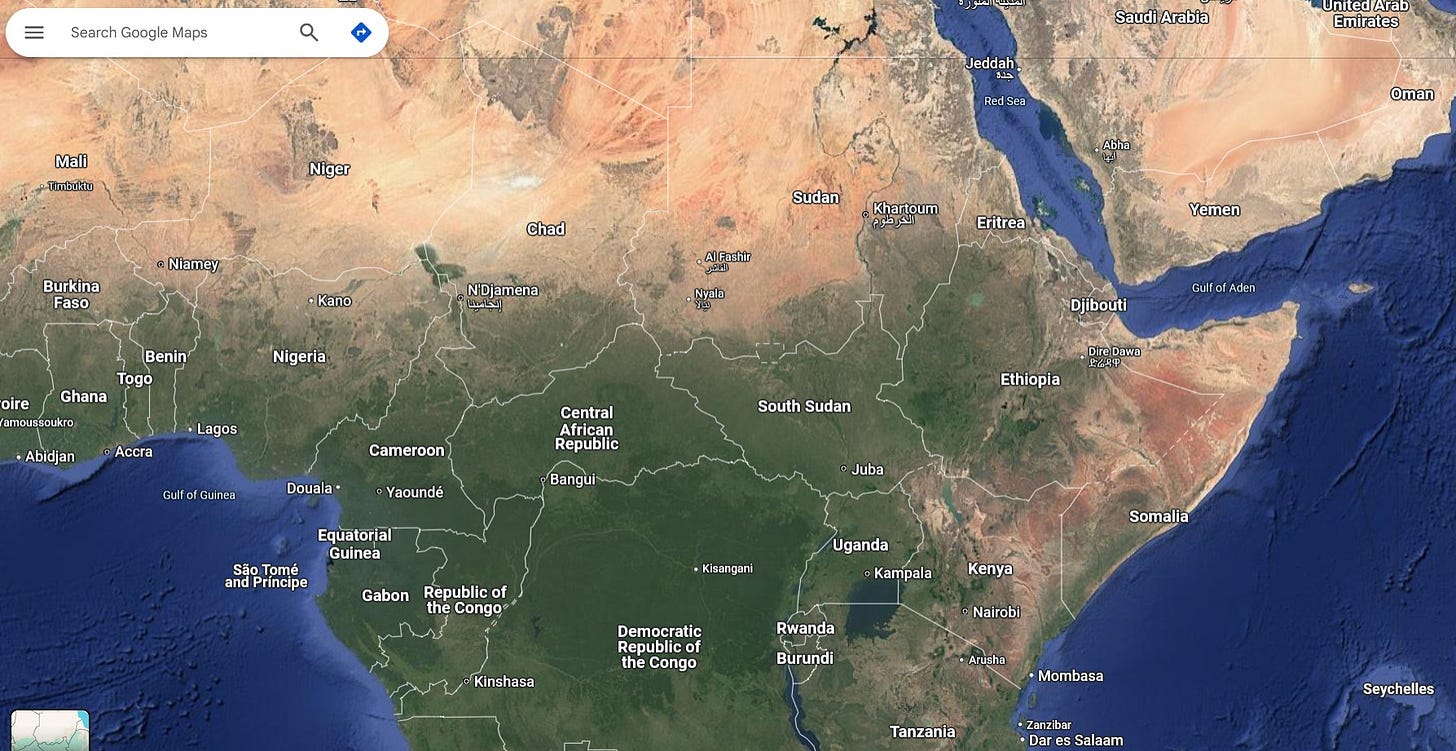
We offloaded. At 4 PM, I traveled to Kenya, to see my girlfriend. And at 5 o’clock the civil war started again.
We were very devastated. My brother was in Uganda and I was in Kenya.
There was no flight. I had to go to South Sudan. For three days, there was no flight. The moment I saw the first flight, I boarded with that plane. And I was the only one in that flight, because that flight went to South Sudan because of the emergency, like to take out people. But I was the only one in that plane, going there. Even the cabin crew said, why are you going to South Sudan? Isn't there a war in South Sudan?
And I told them, you know, if it doesn't come in one way, it's a different way. If we don’t follow through on all our projects, it's also a form of death for us. I have to go back there and to protect what is happening.
Then we asked our client, UNOPS, by then, if they can stock [safeguard] our equipment. But they refused because the contract was for delivery and installation and commissioning. And they were right, for their own safety. So we have to keep this [battery] item and we have to pay extra costs to make sure it is safe. But the problem is the civil war was all over the project area, so we cannot deliver it.
After two months, UNOPS gave us a green light. “If you guys can be able to install it, go ahead. But we will not be responsible.”
We were keeping it with us in the store, and we were very worried. It's huge money, and we borrowed some of the money from friends and the suppliers, and they started asking to be paid back. We were very under big pressure. Especially because we had that bad experience previously in 2013, and we don't want to happen again, for all our stuff to be looted.
So I had this one Ukrainian friend, he's a pilot. I asked him, “Uh, we have this project. We need to deliver this lithium battery to some project sites but a big lithium battery is not safe to transport in a plane [due to the low pressures at high altitude dangerously affecting the battery]. But if you fly at a low altitude, a low height, it is possible to deliver it. And I can pay double.”
He took the risk. He accepted so we started delivering the lithium battery with the plane. We were very close to the ground, because we cannot fly at high level, to protect the pressure for the lithium battery. It was very dangerous and we took very huge risks.
We delivered this package to all the sites via plane! [By flying very low over an active civil war!].
And UNOPS was like, “Very amazing.” USAID was the main donor of the project by then. They were very also happy, the project had come up to it. We commissioned the project.
Then that day after we commissioned this project, we decided if that is the case and it happened to us twice, we need to diversify our market. We chose Uganda. There we can keep our stock, plus our human resources. So that was the day that we started expanding outside South Sudan, and webecame larger. You know, we were opening in Uganda for a safe site to keep the stock, but we found out that we can do better business in this country. From Uganda, we went to Rwanda, and we kept continuing to all the countries that we are operating in now.
That is absolutely amazing. What an incredible story. You guys are the heroes of the Renewable Energy Revolution, doing incredibly bold, adventurous things.
Thank you, buddy.
Could you tell me about your pay-as-you-go solar-powered water pump model?
When we were in Uganda, in 2017, most of the trend in the market for solar industry was towards pay-as-you-go light solar systems. For us, we were doing a lot of projects and we were implementing a lot of projects in a very challenging area.
Then we come up with the idea, why can't we do this pay-as-you-go with the farmers? I remember that day when we had a discussion. There are a lot of small scale farmers who cannot afford it. They cannot afford the initial investment for a solar water pump. But if we can integrate this system, pay as you go, with the pump, then we can give them the solar pump at zero cost! They can pay us for the water amount they use.
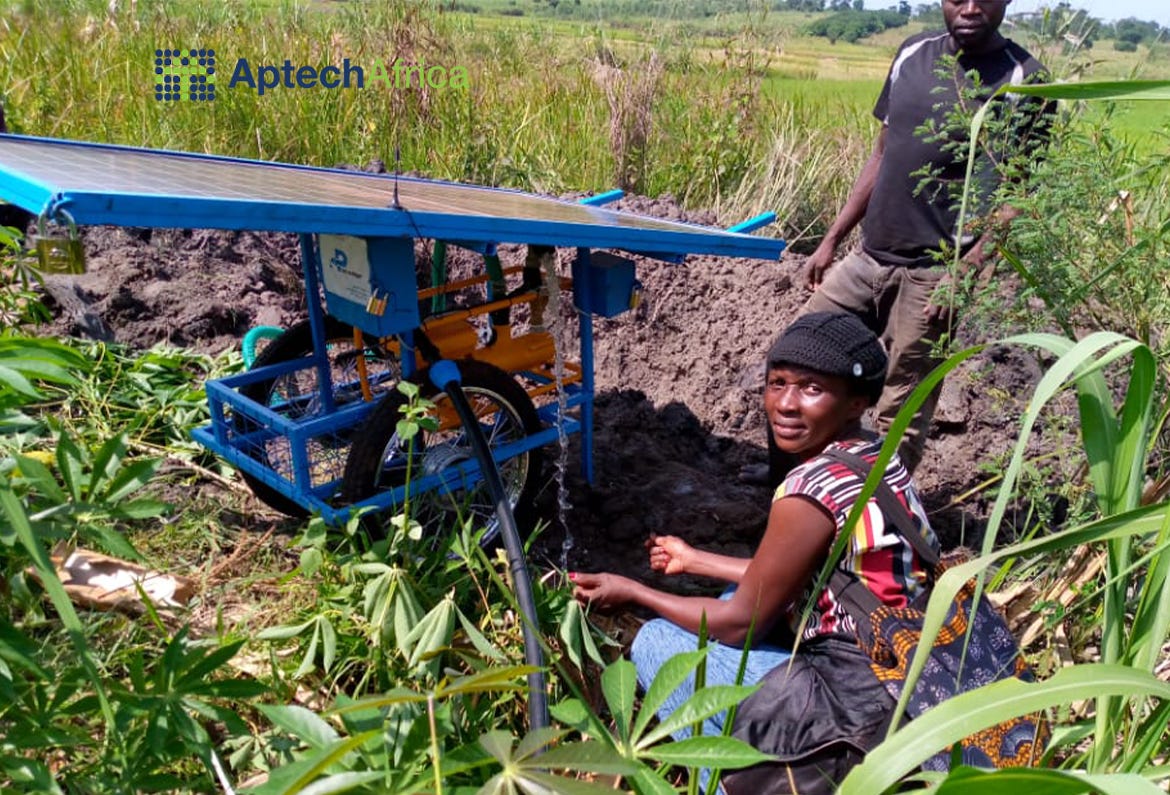
So we started giving these small scale farmers the solar pump. It is an amazing pump because it has also wheels, with which they can take it to and from their farm. You know, they cannot leave it where they are. They are a small scale farm. It's not guarded. It is an open area. So we put the solar pump on two wheels so that they can push it, so they can go into the farm area. Then they can pump and they can use it. They pay us for the amount of water they use, because we have that pay-as-you-go system. And they can take it back to their small homes, they can protect what they have.
And with this, they can achieve — normally they have the incentive to plant in expectation of a harvest only once or twice a year, to wait for the rain. With pumped water, they can achieve harvests three times a year! So it was an amazing project.
That is incredibly valuable.
What are some of the most popular solar products you offer in addition to the pump? I know you have water purification and a whole bunch of other things.
In the past four years, we have really attached to UN projects. We are the only African company who has long-term agreements with multiple UN agencies! Including UNDP, UNICEF, UNOPS, WFP.
What's happened with the UN body is, one, they have allocated some funds for green energy, and they have created a team in Copenhagen where they have a head office for procurement. They created a team of engineering, a technical team plus a procurement team to support all the country UN offices.
In Uganda, if the UNDP office there wants to procure solar panels for some project, they may not have enough technical personnel or they don't have enough data which company is better, so they go to the Copenhagen team. The Copenhagen team has the list of LTA, long term agreement, holders, companies that went through multiple verification and they are pre-selected. They only advertise it to these companies, so this will cut the amount of applications or the amount of bids they receive. They have a shortlisted company and they have shortlisted prices.

So this is the way we've been working with UNDP, and as of now we have done at least one project in up to 31 countries. Not all in Africa. Iraq, Armenia, Palestine, Afghanistan, Yemen, and India, all the way to the South Pacific like Papua New Guinea, and Samoa. As well as in many African countries in our continent.
So we've been focusing more on UN based projects. They are a very trusted client, which means they pay. You know, we have this payment challenge in some projects. When you get a project, you don't get paid or it gets delayed. But with a UN project, it is secure and it is a good client and they have multiple projects.
So to answer your question, which products we are using. Solar plus energy storage systems, and some distribution lines in some areas. We normally use solar products from the top 20 companies in the world, whether they are located in China or in India or in the Middle East or Europe or the U.S. Mostly Chinese. And when we say Chinese solar…example, a BYD battery is from a public company that’s in China. But also, if we use Canadian Solar, they also are manufacturing in China. We use also Tesla batteries in some projects. For the solar panel, there is Jinko and multiple other products that we are using.
I am really honored to be talking with you, because I feel like this is among the most important jobs in the world that you're doing. Helping Africa get electricity!
One thing that I'm interested in is how renewable energy isn't just helping prevent climate change, it's helping people survive climate change. With even a little electricity, you can get a charger for your phone, so you get warnings of extreme weather, or apps with information on how to deal with crop pests or something. People can power a heater during a rainy spell or a fan during a heat wave. Stuff like that.
Have you noticed any case studies you've seen of your products being used for climate resilience, helping people survive the chaotic world of the climate-changed Earth?
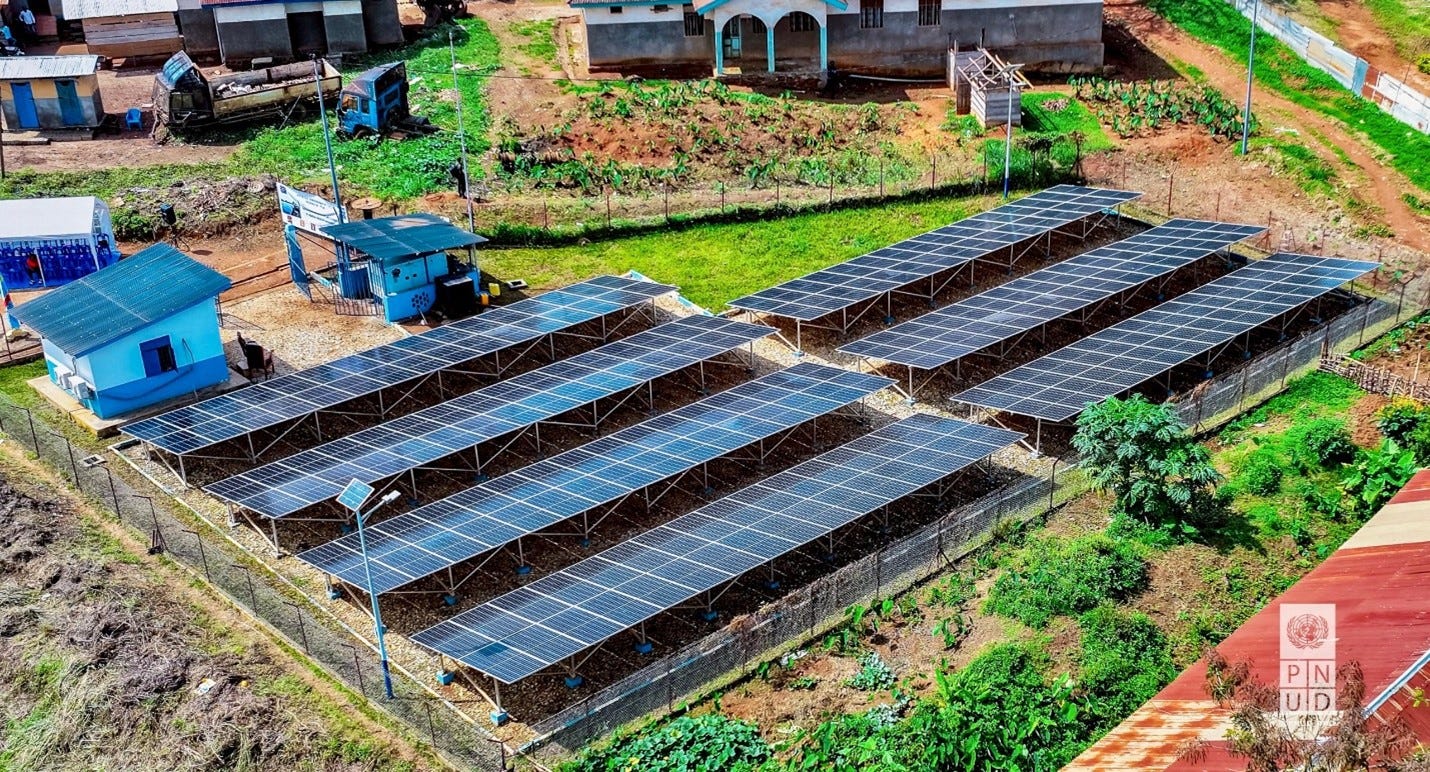
We are in South Sudan, in Congo, in Central Africa Republic, Niger, Sierra Leone, Nigeria, Guinea. We are in frontier markets! Now we have a branch in Papua New Guinea — the country itself is a frontier market that really needs big attention.
Many international companies, they don't go there to Central Africa to do solar projects. For us just to be in that country is a big contribution before even we reach the end users. Just to be in Central Africa and do the solar project, for us to be there, we pay three or four times extra cost than other companies.
For example, I can give you the costs that we face. Like if I'm going to do a project in Sierra Leone, the finance rate, the interest rate is 26%. If I'm doing projects in Central Africa, I have to pay 28%. In the U.S., it's 3-4%, right? But I have to pay 28% interest rate to finance a project. And on top of that, there’s the hardship that you face due to lack of infrastructure to deliver this kind of sensitive product all the way to the village in some rural areas.
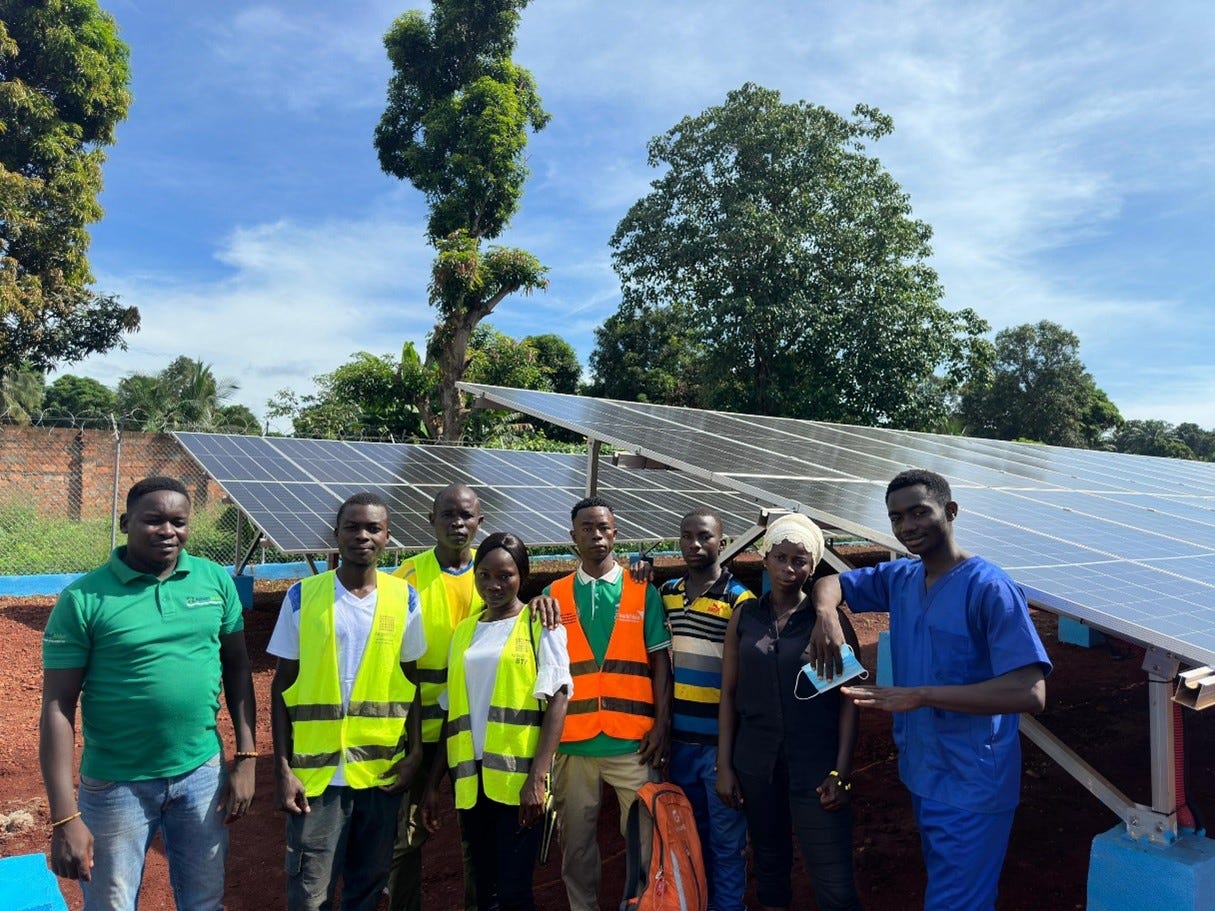
With Aptech, what it amazed me is the impact we do on the ground. It’s so amazing because of the amount of children that we influence in the school, or in the hospital, or in the community. And in terms of hospitals that we install, the communities that we reach, almost 90% are very disadvantaged communities. They are located in the area where many companies, they don't go and give the solutions.
And at the same time, we are connected also to the developed world. We are located in a very frontier market and we are bringing this technology to the end users. We are a bridge between the disadvantaged community and where the Western world enjoys the technology that exists. We do a massive, massive, massive change.
For me, I always sleep well when I normally go to the field. You know, I'm a field person. Even if I'm a CEO, I still go to the field. I really love it every time I travel to the field. I try to check all the projects we have on the ground, which sometimes requires 1,000 kilometers of driving on a very rough road and sometimes unsafe roads, But when you go there and see the impact that you do, it is so amazing. For example, now we are doing one project in Papua New Guinea.
You understand how Papua New Guinea is, yeah?
I've never been there, but I've read about it.
It has a lot of challenges, naturally. The project that we are doing is far from the main island. It is another small island, not only on that small island, but also at the end of the small island, close to the Solomon Islands. So you have to fly first from Uganda to Papua New Guinea. It takes like two days because you have to fly from Uganda to Qatar, Qatar to Singapore or to Philippines, and then you go to Papua New Guinea. Then from Papua New Guinea, you have to fly again to another island. Then from that island, you have to drive like a thousand kilometers in a very rough road. So the journey for me to go from Uganda to the site, it takes like six days reaching there.
The project that we are doing now is one megawatt solar and two megawatt-hour battery. But the community that we are serving for this project, the people that they are there, how amazing they are! How protective they are for that project, because they are so excited to get such a kind of project in that area.
Even though it is not a safe environment due to different political issues they have, when it comes to our project, everyone is so protective, everyone is very supportive because they can see how big an impact it will have them on the ground.
So for me, it is amazing the impact that we do. And that was some of the frustration we had when this pay-as-you-go comes. You know, pay-as-you-go, most of the companies were owned in a Westerns background. They have this advantage access on finance, advantage access on professional networks. Many companies, they come here, they do a lot of advertisements and they get a lot of grants and also a lot of finance from the U.S. or from Europe. Yet the impact they do in the ground is just about one picture.
And for us, we are paying extra costs off to just to finance a project. Imagine financing your project at 28%. It's so expensive. Maybe from Uganda, we can access it at least in a cheaper way than in some areas. Still, it is too expensive when you are comparing it with a U.S. or European company. Some companies, they come with a lot of money, but the impact is little. But Aptech Africa, trust me, just for us to be located in these countries is a big impact.
That is so amazing. You've risen by yourself with very little foreign investment or support. That is just incredibly inspiring that you've built this, not as a development aid-funded project, just by sheer grit and determination.
I read that you have plans to make your own lithium batteries in Uganda. You’re getting into manufacturing as well as installation, now?
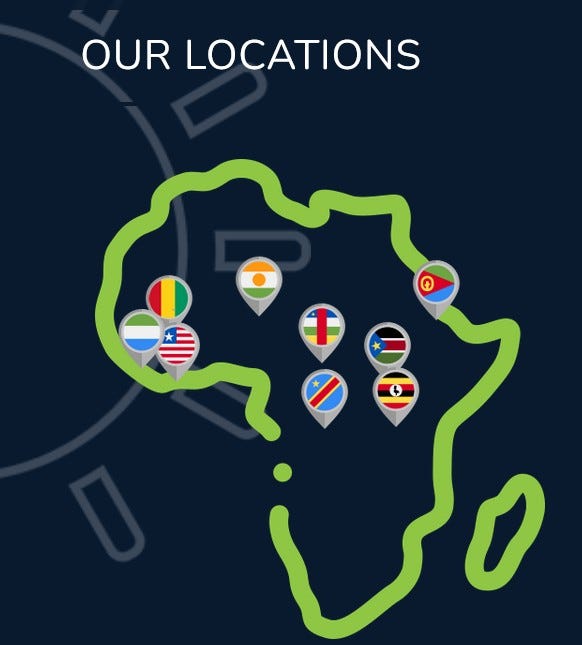
So in Africa, we have permanent office locations in nine countries throughout Africa. And from our head office in Uganda, we did projects in up to 31 countries, all over the Middle East, East Europe, in Asia, South Pacific and Africa.
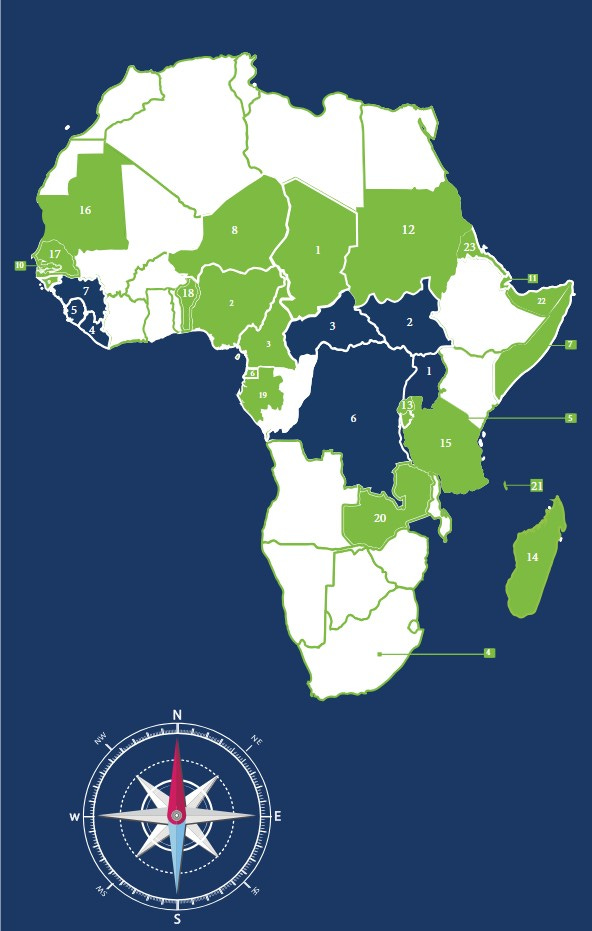
How we are structuring our company now is, we have created the Massawa Group. The city of Massawa is where I grew up in Eritrea, where I'm born in Eritrea. So we have this new company called Massawa Group, and it’s our holding company. We registered it in Mauritius.
This holding company now owns Aptech Africa as well as Soleil Power, our real estate and manufacturing company that we are newly developing. Soleil Power is doing the lithium-ion battery manufacturing. We have already bought the land, we have already made the prototype. In fact, we are launching this month and we’ve even already started selling some of the product.
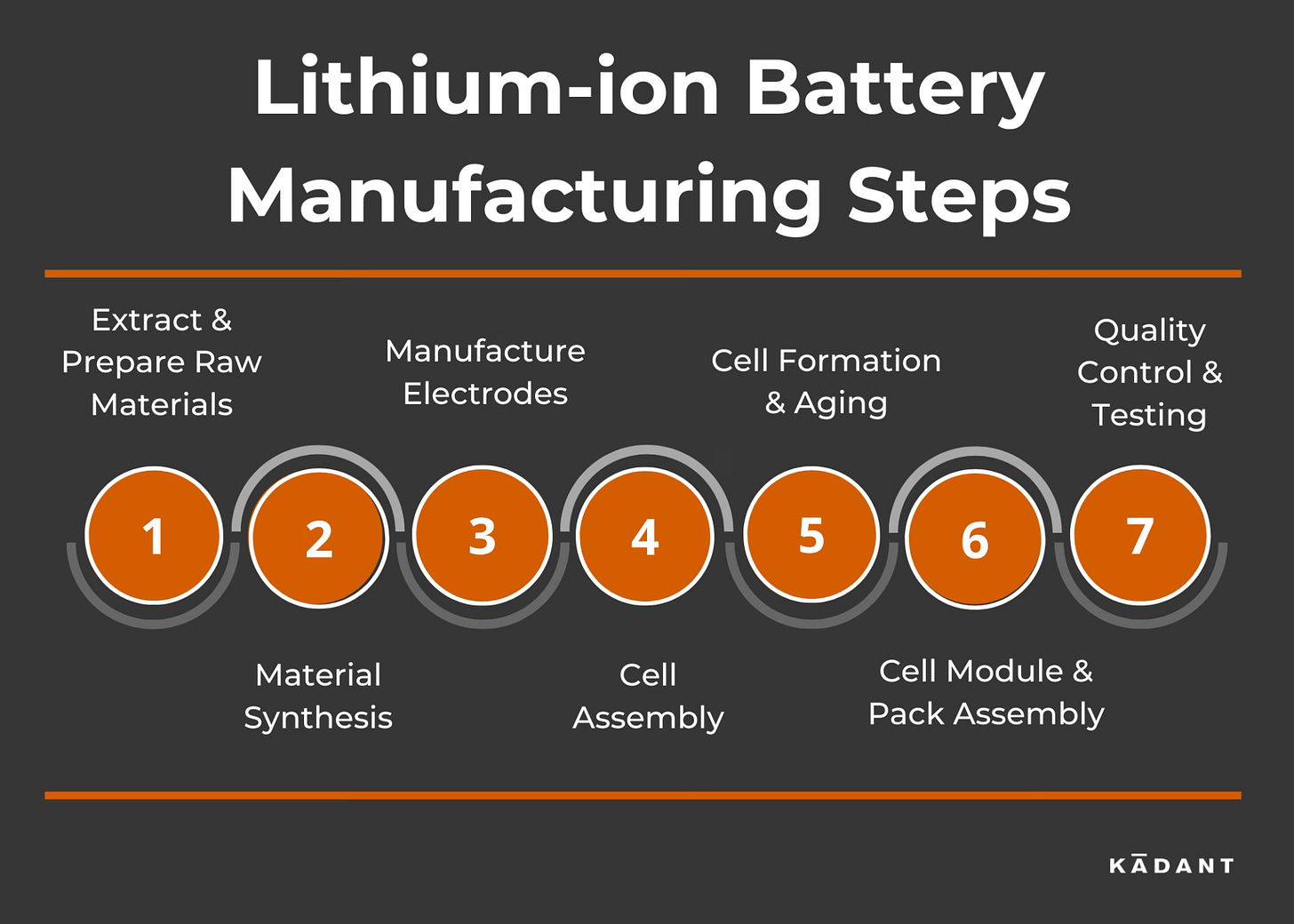
So our plan with Soleil Power is the lithium-ion battery factory that we want to do. Of course, in the world, there are very few companies who really manufacture the cells. [Cells are a basic building block that can be assembled into battery packs. Check out this in-depth discussion of the steps in the lithium battery manufacturing process]. The rest, including Tesla or Huawei, all the big companies, they buy the cells and they have their own BMS [battery management system] and they fabricate it and they sell it. So that's what we are doing. We buy the cells, have our own BMS and our own fabrication processing area. So our plan is instead of importing [completely finished battery systems] from China, we can customize the system according to the client. And we sell it here, in different system sizes.
You know, we have a lot of amazing ideas, but we always lack the funds. We cannot go to the bank, it is so expensive. We don't get the grants that we want, as much as we want to do this amazing work.
Our plan in the lithium battery project is to have our own energy storage system, and we can use that as a partner for electrical motorbikes. Sooner or later, we will have our own electrical bike and our electrical tuk-tuk. Do you know this, the three-wheel bike?
Yeah, that's awesome!
We will have our own three-wheel bike, in this frontier market where there is no access for a proper fast charging station. So our plan is to create in Central Africa, in Congo, in South Sudan, to start selling our energy storage system plus the electrical three-wheel bike, selling essentially a charge station for multiple people to have. Because if you go to South Sudan, it's only 9% of the population are connected to the grid. So when you sell them an electrical bike, where will they charge it? They need a proper charge station. So we will provide our own charge station as a very scalable business.
That's why now we have created the Massawa group in Mauritius, so that we can attract investors from the US or from Europe who are very interested in terms of the social impact that we are doing, in terms of the impact that we are doing with renewable energy on global warming. And the impact of what we are doing on the future, bcause we are really changing a lot of mindsets on the ground by adapting them to this green energy, sustainable power. Most of our end users, they are not really exposed to the technology.
And I can tell you personally, this sustainable system is not about only making money. I have to make sure my kids have a safe haven, something that is coming to their future.
I cannot just sit, only waiting.
So by impacting many people on the ground, I make sure that I am part of the change, what is coming to the future. Solar power will really do a big impact. That's why now we open this holding company in Mauritius. After July, we will start pitching to different investors. I hope we'll find some interesting investors who are very interested in this kind of program! This is our plan.
This is amazing! I hope that some investors read this article that I'm writing about you and will contact you because of this.
So your lithium-ion battery customization factory, that's in Kampala, that's in Uganda?
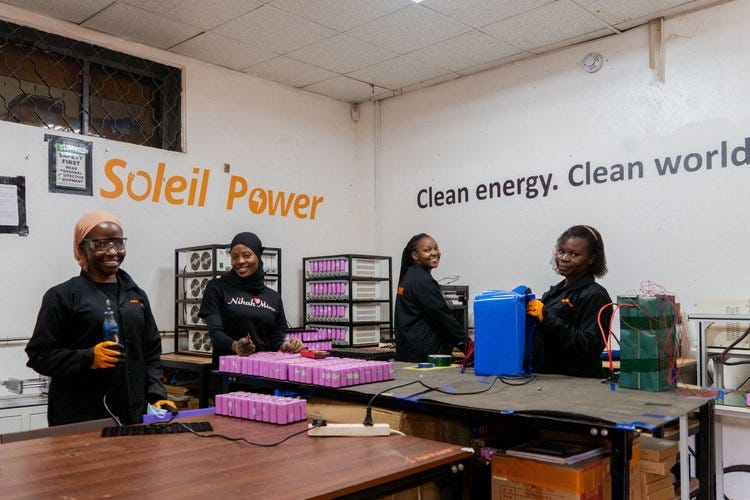
Yes, in Uganda. We already bought the land. We have the store and we develop our prototype. We settled already the fabrication material. Like I said, we are launching this month and also we already started selling our products. This week, we are shipping to South Sudan from this lithium battery manufacturing site!
That is so freaking inspiring!
So you started in 2011. The whole renewable energy market has advanced so much in those 14 years. There's been so many advances in solar panel technology. It's gotten so much cheaper. What's your perspective from your point of view of the global state of renewable energy, and especially of the state of renewable energy adoption in Africa? Are you seeing exponential growth? What do you think the future looks like?
On accessing this new technology, we are okay. In Africa, we can access it. But we are behind on inventing. Like what we are doing for our lithium battery, it is very hard work for us to make with a small fund, with less knowledge, with less...this kind of project has to be supported by the government. It's not only about setting up a manufacturing plant. You need a proper tax regulation, you need a proper support from the government for us to be able to compete with the Chinese, Indian, or U.S companies. Setting up a lithium battery factory in Africa is very expensive. From power sources, from government regulation, from human resources, everything is very expensive. So we are far behind on contributing to the technology in Africa.
But we are in a better position to use or to access the technology that exists. Because the world is now smaller, so the knowledge is shared. When there is a new product, right away, in one month or two months, it will be there in Africa. What I can say is, in terms of accessing and using the latest technology, we are in a good position, we are okay. The world is smaller, you can understand whatever comes up, you can use it.

But in terms of creating our own technology…I have seen that one group of guys is investing 100 million to have their own lithium battery manufacturing in Africa. They are Nigerian, so what they want to do is, instead of exporting the minerals to China and importing the cells from China, say “We have the minerals and we have the money.” They are trying to create their own lithium battery cells manufacturing.
So once they have that, in Africa, we can easily use these cells. We can have a 100% made in Africa product. And we deserve to have such kind of product in Africa. If we are the owner of the mineral, why do we need to export it as a raw mineral and buy the finished product back? It doesn't make sense.
So maybe sometime in many years, it may be a different story. I can say we are behind in terms of contributing to the technology, but we are okay in terms of using and utilizing what is there. This young generation, we are waking up and the world is changing and we are adapting!
You mentioned government regulation. What is your relationship with the governments where you work like? In Uganda, is the Museveni government supporting your lithium battery manufacturing efforts? What was it like to sort of negotiate with the various sides in South Sudan? Do you guys talk to government leaders a lot or do you just sort of show up and hope they don't bother you? What is the political aspect of the job like?
In Uganda, Uganda’s government has done an amazing job on adopting some good regulation for renewable energy. For example, they were the first to adopt tax exemption for solar, batteries, and some solar related items. This is part of why we opened there in 2016 — because when we import, it is completely tax-free, for solar. We can keep it and resell it to Congo and to South Sudan.
So in terms of supporting the renewable energy market, I can appreciate what they have adopted a long time ago. But when it comes to this lithium battery manufacturing, it's still new to everyone here, so there is no regulation or any support.
You know, with this kind of project, it's not only about a factory, it's about the impact on global warming, the impact that you do on the community. For such a project, you need to be supported in all means. You should get maybe free land or maybe two, three years tax holiday.
In some countries, there is a lot of support that we get from the government. But for the lithium battery manufacturing, we still have not really gotten support. We hope that once we start selling and the government sees what we are doing, we will work on the regulation side.
You know, for us to be just in this market… let me tell you, for the long-term agreement holders, our competitors for UN projects, some of them are in Europe, okay?
Yeah.
In Europe, most of them are European companies, they have an interest rate of three percent or four percent. For me, I have, say, 15 percent interest, and I have to compare with them. If I buy a solar panel that’s 100 from the manufacturers, my purchase price including the interest rate of the bank is 115, but their purchase price is 103. So I am behind the competition even before I put my own markup or my own profit. [This “higher interest rate trap,” caused among other factors by higher real and/or perceived risks of investing in Africa, is a major problem for African governments and companies.]
We pay extra, we do a lot of extra effort just to be in this market or just to compete with this company. Now, imagine you have to set up this lithium battery factory in Uganda. On top of all the hardship you have, you have to start lobbying and get the regulators to understand and to support it. Not like in Europe or in the US where there is already an industry body or NGO that lobbies on this kind of stuff. Any solar company, the effort they do in Europe or in the U.S., we here have to do three or four times as much effort in all directions.
You obviously had the looting from the South Sudan Civil War. Are there any more really unusual or dangerous events that you've had to deal with? Have you ever been harassed by the Wagner Group in the Central African Republic? What are the dangers to doing work in these areas that you have to overcome or adapt to or avoid? In addition to the finance issue, what are some of the threats you had to manage?
So, like I said, most of our market is frontier market in the rural areas. In rural areas, you don't only face the challenges from the government or from the officials, but also even from the communities. In some areas, it's not regulated by the government. It could be a rebel area or it could be an area where government doesn't have a stronghold or strong control.
In one country — I’m not going to mention the name — we imported the material, entering our equipment to the country. So the material was inside the country. But the project was outside the capital city. Then when we went outside the capital city, in another location, they say we have to pay tax a second time. We tell them we have already paid to the national government. It is within the country. Why do we need to pay twice tax?
They say, no, that one is national tax and this is a different tax. So you have to pay two times tax for inside one country!
You have to face such kinds of hardship. In some communities, they will tell you that, you know, whatever you paid there we need to be paid here again. It comes just as the environment where you are.
What else would you like to share?
So, you know, for us, Sam, we do a lot of impact on the ground. And I'm sure there is some organization in the U.S. who really wants to support or contribute to this good cause. But normally there is a gap between the real player on the ground and the real donor or the real funder. In case there is some organization where they are really interested in this kind of impact, I wish we could find a way to communicate with each other, to connect with each other, removing all the middle people that play around. Some organizations, they want impact but there are many middle people that consume their budget and it becomes only a small impact on the ground.
I wish we could find good U.S.-based investors for the Massawa Group. It’s a profitable company! It’s very impactful on the ground. It has a good impact on the future. Three birds with one stone! You’re protected in terms of profit, and you have a big positive impact. I wish we find these investors for us so that we can together we can increase our impact.
I hope someone reads this and invests in your company!
We just newly created this supporting company because most of the countries we operate in are under restrictions or not safe. People will not feel safe to invest in South Sudan. But our Massawa Group holding company is in Mauritius, very stable. Our investors will only be dealing with the holding company where it is very safe and smooth. Through the Massawa Group, throughout Africa, we do the hard work in the problem areas.
There are many investors who are really interested in investing in renewable energy. especially in African company. But there is always a gap to connect these two worlds. I hope through your channel, we'll reach some investors.
As I say, Aptech Africa, we started with almost $18,000 and two brothers in 2011. Then we start opening our branch, our first branch in Uganda, and we kept continuing, in many countries. Now we have branches in nine countries. We employ almost 200 people from 17 nationalities. We have U.S. citizens, we have German citizens, we have Ethiopians, Kenyans, Indians. We have multiple nationalities that are working with us. On top of these branches in Africa, we have our engineering department in India, so we have some few staff that are in India. They help us with the preparation. Also, we have individual personnel in China that support us for procurement. Through these diversified nationalities, we have an amazing team, amazing development, amazing advantage.
From where I was born, from a small country, Eritrea, and from a small city in Eritrea….to come up to where we are, managing close to 100 people, and doing projects in 31 countries, I never imagined I would be here. Who would be expecting me to do a project in Palestine, in Pakistan, Yemen, or Papua New Guinea?
This is something that I never imagined. Doing this project, and from Uganda working with this amazing team, multiple nationalities, multiple cultures, enjoying different languages, different food, and different personalities. We have created a very amazing company.
Pardon the language, but you guys are f***ing superheroes! I'm really in awe of the work you're doing. You're just doing this all the hard way. You're turning a profit selling solar panels in South Sudan. You are just really, really good at this. You're building this growing and profitable business in extremely difficult circumstances.
Whatever we’ve done, whatever we achieved, it required three, four times more effort than for other companies, companies like us who are operating from the US or from Europe. Just to be in these disadvantaged areas, being in Central Africa and Congo, getting looted twice. We have really done an amazing job.
And moreover, it's not only what we have achieved, also what we have impacted. Millions of people that we have impacted through our project. It is amazing.
Anyway, Sam, thank you so much also for coming up to bring our story to the world It's a pleasure to meet you. In case you come to Uganda or anywhere within the region that we operate, let me know. I will invite you for our traditional coffee.
I am hoping to go to East Africa sometime in the next couple of years to write about some of the amazing stuff happening. I would absolutely love to meet you in person and see some of your projects.
Sure, sure! I can't wait to see you and offer you our hospitality. It's a pleasure to meet you, Sam.
The world needs people like you very much. I am honored to help share your story! Thank you so much.




